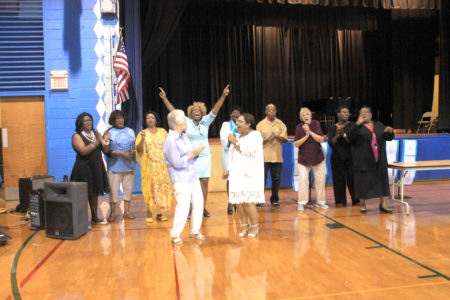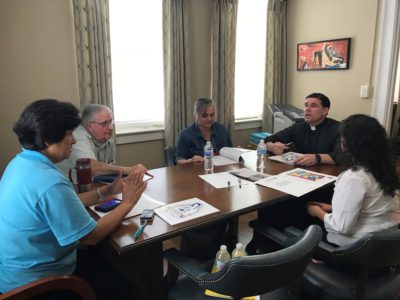By Laura Grisham
HOLLY SPRINGS – This year, St. Mary’s/CADET/Holy Family School celebrates 70 wonderful years of education.
During Labor Day weekend, several hundred alumni and educators gathered to celebrate. No doubt it was also a grand undertaking for those on the reunion committee, and in particular, chairman Vincent Smith (Class of 1981).
Two years after World War II ended, Sacred Heart Father Paul Frichtl, bought an old abandoned school building in Holly Springs and began to make enough repairs to make the building usable. In 1948, the St. Mary School for African American children opened.
The following year, four School Sisters of St. Francis arrived to work with him. When St. Mary’s began, eighth grade was the highest level offered. Another grade was added each year until all 12 grades were available. In 1954, the first seniors were graduated from St. Mary’s High School.
In 1969, St. Mary’s merged with St. Joseph’s to form C.A.D.E.T. (Christian Aided Development Through Extraordinary Training). CADET Child Care Center opened in 1974 with 25 children and CADET High School closed. A new computer lab was installed for students in 1995, and with that, CADET changed its name to Holy Family School in order to provide a stronger Catholic identity.
“Seven decades have brought about many changes in our world and in our schools, but the commitment of Sacred Heart Southern Missions (SHSM) and the Priests of the Sacred Heart to educating hearts and minds remains steadfast,” said Fr. Jack Kurps, SCJ, executive director of SHSM.

Above, a pep squad of current Holy Family Students cheered on those attending the reunion during a Friday night meet-and-greet. At right, Sr. Cathy Mauge, OSF, and Cathedral Pryor Wilkins at the picnic on Sunday.
“Our school has been and remains a sanctuary for children, where they are safe and receive guidance, discipline and love. Our students receive a quality education — a firm foundation not only in academics, but also in Christian values and respect for one another.”
Friday evening, guests were treated to a meet and greet, complete with tasty food and jazzy entertainment. The Holy Family Pep Squad greeted alumni with cheers and acrobatics to begin the evening. Beta Club members offered tours of the building.
The next day alumni volunteers cleaned out the school’s basement. Much to the delight of current Principal Clara Isom, two dump trailers of trash were removed. Equally hard work was being performed upstairs as members of the reunion committee set up and decorated for the banquet scheduled for later in the evening.
Nearly 200 former students, teachers and principals attended the gala Saturday night. The evening began, as does every event, with a prayer. Several alumni addressed the gathering, sharing fond memories.

HOLLY SPRINGS –The reunion chior had the crowd on its feet singing ‘Oh Happy Day’ at a Sunday morning worship service to celebrate Holy Family School’s 70th anniversary during the Labor Day weekend. (Photos by Laura Grisham)
Former Cadet principal, Sister Sheila Kloss, OSF, was the guest speaker for the night. Traveling all the way from California for the event with another former CADET educator, Sister Cathy Mauge, OSF. She greeted attendees with heartfelt enthusiasm. Citing the gospel, “’Lord, it is good for us to be here. This is a sacred place.’ All of us and many others over the years made this a sacred place by coming together to live, to learn, to love.”
Sunday began in earnest with a rousing worship service. Prayers, scripture and hymns filled every corner of the school gymnasium. The Reunion Choir and Rev. Catherine Robinson Willett had everyone on their feet with “Oh Happy Day.”
Services ended prior to noon, giving those in attendance just enough time to don their blue reunion t-shirts and some comfortable shoes before attending a closing picnic.
(A longer version of this story appeared in the Sacred Heart Southern Missions newsletter.)



